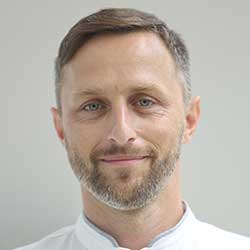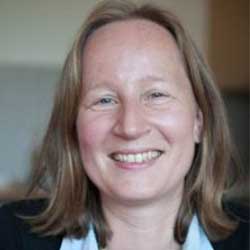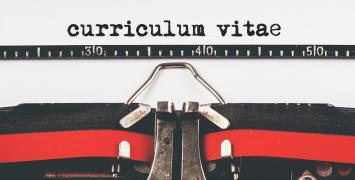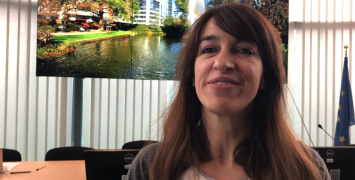Slovenia - Research Proposal Reading Days

Since 2018, potential ERC applicants in Slovenia have a unique opportunity to learn from researchers with first hand ERC experience, by obtaining access to and discussing their successful proposals. We talked to the person who introduced the popular scheme to Slovenia, “National Contact Point” Dr Andreja Umek Venturini. This is only one of a range of initiatives that have prompted a steady increase in the success rates of Slovenian applicants.
What is the Reading Day initiative about? And how was it born?
At an NCP meeting in Brussels, I heard about an Austrian initiative, created by the NCP Ylva Huber: the “ERC Reading Days”. It immediately sounded to me like something that Slovenian researchers could benefit from. They could get their hands on successful proposals and see how they are structured, how the CV is presented, how text is mixed with graphics and pictures.
They could get their hands on successful proposals and see how they are structured, how the CV is presented, how text is mixed with graphics and pictures
So I tried to establish a similar initiative, and the first Reading Day in Slovenia took place in September 2018. From then on, we have held these three times a year, approximately before the deadline of each main ERC call. I think as a result of this, our success rate at the ERC has been improving - but there is still a long way to go.
What happens during these Reading Days?
First of all, when they register, participants specify the proposals they would like to read. Then, they can look through the proposals and take some notes, but they are not allowed to copy them or take pictures. Sometimes they go into the details of different proposals for a while, and sometimes they just go over the text quickly. I am always there with them – partly to make sure no information leaks, but mostly to answer their questions.
What is the audience like?
Usually we have about 20 to 30 people, and it takes 2/3 hours. In general, they are young. However, I would say 10-15% percent of participants are in the Advanced Grant category and are already experienced in writing proposals. Initially, ERC grantees were surprised by this idea. They wondered how it would be organised, and some of them did not want their research to be circulated widely on the web. However, after we assured them that it would be only on paper and told them how helpful it would be for applicants, almost everyone decided to add their proposal to the library.
I have to say, the participants of the Reading Day are very glad to have this opportunity and look forward to it. It is a Slovenian success story now. With the Covid-19 crisis, we cannot gather like this anymore, so in March I suggested the potential applicants come to me individually.
With the Covid-19 crisis, we cannot gather like this anymore, so in March I suggested the potential applicants come to me individually
I copy the proposal they would like to read, we meet in a nice conference room and sit across a long table – one participant at a time. Slovenia is not a big country, so I can manage.
After grantees put their proposals in a database, do they take part in the event otherwise?
No, they are happy with this arrangement as they have a lot of other tasks and obligations, so they put me in charge of their proposals. ERC grantees get a feeling that they are helping without being heavily involved in the event.

|
What is special about the initiative?
Sometimes institutions that have successful ERC grantees can share their proposals internally. The Reading Days have been so appreciated because they provide access to other proposals, not only within one’s own institution or from a colleague. The participants can see different approaches, and it is inclusive for those institutions that do not have any ERC grants so far.
What else do you do as Slovenian NCP to help potential applicants?
First, we have National Information Days, to which I usually invite grantees or panellists to explain the application process from their own point of view, and in a practical way. Second, we are very responsive to institutions. Usually the bigger and more ambitious institutions in Slovenia have their own workshops and invite grantees to answer the participants’ questions. There are around 20 visits to institutions per year.
Those applicants who move on to the second stage of evaluation and face an interview have the possibility to take part in a “mock interview”. I invite ERC grantees or experienced researchers from their field to put the applicants under a bit of pressure and to let them present their proposals and answer questions.
Finally, on the initiative of the ERC, we have created a fellowship to allow future applicants to visit ERC-funded research groups.
we have created a fellowship to allow future applicants to visit ERC-funded research groups
This project started only in 2017, but it has become quite popular and received positive responses so far.

|
Is there anything else you are working on?
Since we had quite a slow start for Slovenia in obtaining ERC grants, we asked our national funding agency to introduce supporting measures. Since 2010, they have been giving out complementary grants.
Since 2010, Slovenia has been giving out complementary grants
Depending on the success of the proposal during ERC evaluation, it can get national funding (up to 50 000 EUR per year) for a period of two to three years.
Applicants for these grants have to adapt their original ERC proposal – address the critics of panellists, focus more on specific research questions or take additional measures. This initiative has helped our researchers to improve their initial proposal and increase their success rate. Since 2010, we have given out 55 complementary grants.

|



